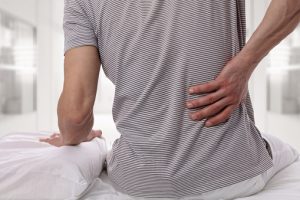 Irritable bowel syndrome (IBS) and back pain may seem like two unrelated conditions, but there are some cases where they co-exist. IBS back pain is often expressed by patients and is sometimes called referred pain, meaning that pain is felt in a part of the body that isn’t the actual source. This may be the result of IBS that occurs due to gas formation, bloating, and constipation.
Irritable bowel syndrome (IBS) and back pain may seem like two unrelated conditions, but there are some cases where they co-exist. IBS back pain is often expressed by patients and is sometimes called referred pain, meaning that pain is felt in a part of the body that isn’t the actual source. This may be the result of IBS that occurs due to gas formation, bloating, and constipation.
How does irritable bowel syndrome cause back pain?
Irritable bowel syndrome is a common disorder that affects the large colon. It causes cramping, abdominal pain, bloating, gas, diarrhea, and constipation. A hallmark feature of IBS is the relief of distressing symptoms upon defecation. Only a small portion with the condition have severe symptoms, and most IBS patients can control their symptoms by managing diet, lifestyle, and stress.
Advertisement
There is no clear reason why IBS can cause lower back pain, but it is assumed that irritation and disturbances in the colon create pain that presents itself in the back. Having bouts of constipation can lead to physical distention of the intestinal walls, possibly activating pain receptors of the lower back.
Irritable bowel syndrome (IBS) should not be confused with inflammatory bowel disease (IBD), as there are no inflammatory processes occurring in IBS.
How to relieve IBS back pain
Treatment
Considering that back pain occurs in only a small number of IBS sufferers, no proper prescribed treatment is currently available for it. It is recommended to speak to an experienced gastroenterologist if you believe back pain is related to your IBS symptoms. However, treating IBS may provide some patients with back pain relief. Medicines designed to cure constipation, bloating, and excessive gas can successfully help manage IBS.
Probiotics are designed to balance bacterial colonies within the gut, helping to promote digestion. They can be found in powder, tablet, and yogurt forms. It is still recommended to speak to a healthcare professional when choosing to incorporate probiotics into your diet.
It isn’t known what causes IBS, but various factors and triggers are thought to play a role. Successfully avoiding these triggers serves as a form of treatment for IBS and may provide IBS back pain relief. Triggers of IBS include:
- Foods: Having a food allergy or intolerance may bring on the symptoms of IBS. Common foods include chocolate, spices, fats, beans, broccoli, milk, and alcohol.
- Stress: Periods of stress, similar to those felt before writing an important test, may aggravate symptoms.
- Hormones: It is known that women are about twice as likely to have IBS, and doctors think that fluctuating hormones may play a role. Many women find that symptoms of IBS tend to be worse during or after their menstrual periods.
- Other: It is possible that suffering from an infectious case of diarrhea or having an overgrowth of gut bacteria can trigger IBS.
Home Remedies
There are various home remedies that you can implement to help relieve IBS symptoms and IBS back pain. These include:
- Deep breathing: Helps to improve mood and reduce stress.
- Cognitive behavioral therapy: A form of psychotherapy treatment with the goal of changing negative habits and moods.
- Massage, meditation, or hypnotherapy: Help to relax muscles and ease pain.
- Yoga or Tai Chi: Both forms of exercise can decrease lower back pain caused by IBS.
- Acupuncture: Involves the insertion of fine needles into pressure points in the body. It is known for relaxing muscle spasms and easing IBS back pain.
Tips to relieve IBS back pain while sleeping
Advertisement
IBS back pain can make it difficult to get restful sleep. However, with some diligence and a routine, you can be certain you are doing your best to limit the amount of back pain experienced with IBS. Try these tips:
- Exercise everyday
- Avoid large meals and caffeinated drinks at least four hours before bed
- Your bed should not be used for anything else besides sleep and sex.
- Don’t sleep or lie down immediately after working out. Instead, try to incorporate a resting period during your exercise time.
- Have a consistent sleep and wake times
Having back pain and IBS symptoms can be a challenge to deal with. If you find yourself losing an excessive amount of sleep or the pain is unbearable, seeing a doctor about your symptoms is recommended. It is possible that your back pain could be due to a different cause, or at the very least, your doctor may prescribe you something to deal with the pain.
Related: IBS vs. IBD: Causes, symptoms, risk factors, and complications
